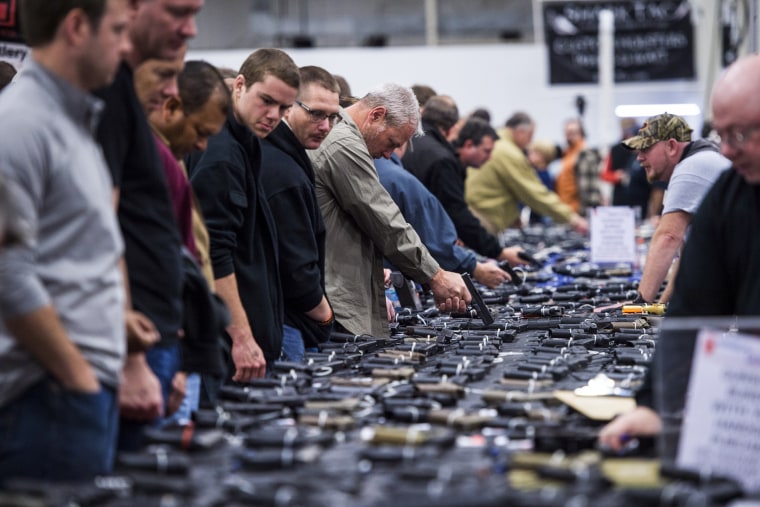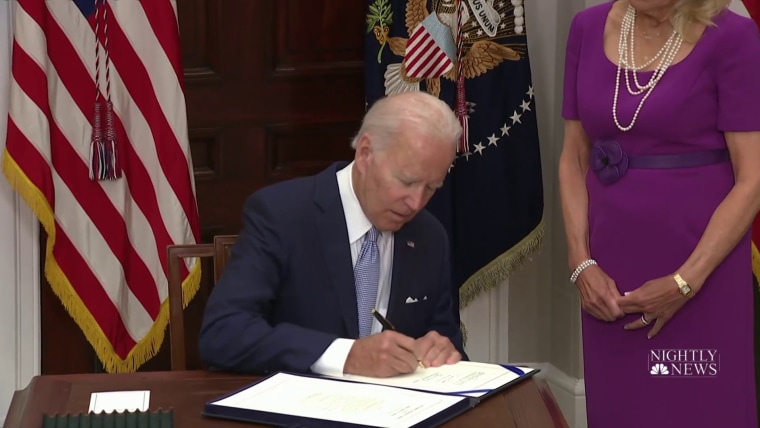As he stood at a lectern earlier this month to debate his division’s efforts to “shield communities from violent crime and the gun violence that usually drives it,” U.S. Legal professional Basic Merrick Garland rattled off a listing of instances his workplace was pursuing towards people who find themselves alleged to have purchased weapons for themselves after which bought them to others.
In a single, an individual purchased 92 weapons from a licensed vendor that had been ultimately utilized in crimes, together with murder and drug trafficking. In one other, Garland pointed to a 12-person gun trafficking conspiracy that moved greater than 90 weapons throughout state traces into Chicago. They had been later linked to mass shootings, a number of deaths and accidents.
“We now have instructed our federal prosecutors and legislation enforcement brokers to prioritize prosecutions of those that are chargeable for the best gun violence,” Garland stated. That features “those that illegally site visitors in firearms and people who act as straw purchasers.”
His workplace could quickly get some assistance on that entrance. There may be optimism that two lesser recognized provisions within the bipartisan gun laws that President Joe Biden signed into legislation final week will put a dent into the unlawful circulation of weapons purchased by way of straw purchases and probably increase the duty of gun sellers.
The primary provision clearly defines straw buying — or when an individual asks or pays a surrogate to purchase a weapon for them — as a criminal offense. It places in place a extreme penalty as properly: As much as 15 years or 25 years when tied to drug trafficking.
The straw buying factor was largely apolitical, three folks near or concerned within the bipartisan negotiations stated, however it might have an enormous impact.
“By creating federal straw buying trafficking offenses on this legislation, we’re undoubtedly giving prosecutors the tooth they should goal straw purchasers and unlawful gun runners,” stated a congressional aide, who requested anonymity to talk candidly in regards to the negotiations. “Our intention right here was to cease issues just like the circulation of unlawful weapons into cities which have stronger gun legal guidelines from states that don’t.”
‘Following a path of blood’
Previous to this laws, shopping for a gun for another person amounted to little greater than a paperwork violation and proving that somebody knowingly dedicated a criminal offense could possibly be tough, two former brokers of the Bureau of Alcohol, Tobacco, Firearms and Explosives, who labored on straw buying investigations, stated.
Prosecutors needed to present that patrons had been purposefully mendacity after they purchased the gun from a vendor and all the time meant to present it to another person to get a conviction. The 2 former ATF brokers stated it didn’t all the time make for probably the most compelling instances.
“Convincing a federal prosecutor to pursue these fees and spend their beneficial assets on what amounted to a paperwork violation is tough,” stated one of many former brokers, Joseph Bisbee, who served within the ATF for 25 years.
Bisbee stated investigators had higher luck after they pulled collectively a bunch of purchasers right into a case and confirmed some factor of organized crime, however even then the trouble might really feel like a waste.
“The penalties concerned had been fairly minimal,” he stated. “In a approach, that made loads of sense as a result of for a straw purchaser to enter the gun vendor and purchase the gun, that they had to have the ability to go a legal historical past verify. And they also didn’t actually have a legal historical past.”
The dearth of a transparent penalty is one purpose that the brokers believed this methodology of buying weapons has been commonplace since at the least the Nineties, when the ATF began extra totally monitoring straw buying instances.
Joseph Vince, one other former ATF agent, recalled a first-of-its-kind examine within the Nineties that tried to trace how criminals selected to accumulate firearms. That satisfied him that straw buying was the primary wrongdoer and must be the goal of legislation enforcement in the event that they wish to keep away from “following a path of blood,” Vince stated.
“Wanting on the information, and the information advanced into tens of millions of weapons, the No. 1 approach criminals purchase weapons is thru straw purchases,” the previous agent added. “It is smart: if you would like a hamburger, you go to McDonalds; while you wish to get a gun, go to a gun retailer — it’s simply really easy.”
Who’s a gun vendor?
The second provision makes a probably massive change with only a few phrases.
It modifies the definition of “gun vendor” from an individual who sells weapons with “the principal goal of livelihood and revenue,” to anybody who sells a gun to “predominantly earn a revenue,” thereby widening the pool of potential gun sellers.
Up to now, Bisbee stated brokers like himself had been typically left not sure whether or not they might goal sure sellers for peddling weapons with no license in the event that they weren’t working one thing as clear as an official storefront. He stated the company was typically left sending “sternly worded letters” to warn people who had been non-public sellers or promoting weapons out of their properties as a result of they didn’t essentially have the enforcement energy.

Whereas the three folks near the bipartisan negotiations tempered expectations that this might shut the “gun present loophole” or have a major impact on the sale of weapons on-line, they believed it could possibly be a major step towards creating an additional layer of enforcement and oversight of a market that operates with restricted supervision.
They stated that that they had in thoughts the Midland-Odessa, Texas, shooter who killed eight folks in 2019 with a gun that he purchased by way of a non-public sale. He had beforehand failed a background verify from a licensed gun vendor and was not allowed to purchase a weapon.
“We’re actually placing these types of sellers on discover that in case you are promoting weapons predominantly for revenue, it’s good to be working background checks,” an aide near the negotiations stated.
This might be a step previous “sternly worded letters” for ATF and potential enforcement, stated Rob Wilcox, the federal authorized director of Everytown for Gun Security, who consulted with Democrats on the laws.
“This type of readability by Congress provides ATF the power to deal with the sorts of economic marketplaces the place you could have people who’re promoting a dozen weapons a 12 months or extra both on-line or at gun exhibits with out background checks,” he stated.
Nonetheless, some nonetheless expressed skepticism about how far-reaching the legislation could possibly be.
Lindsay Nichols, the federal coverage director at Giffords Regulation Heart to Forestall Gun Violence, stated that the modifications had been fairly minor and that with out bigger modifications and elevated funding for companies like ATF, there could be little distinction on the streets.
“Unlicensed sellers would nonetheless not be required to conduct background checks and there could be actually restricted change by way of who has to get a license,” she stated. “This actually simply codifies one thing that courts have already interpreted the legislation did, so it doesn’t actually increase the scope.”

